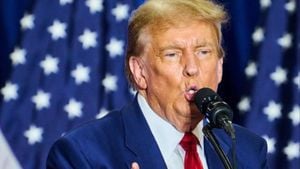Donald Trump's recent victory has ignited discussions about the potential domestic and international ramifications of his second term as President of the United States. Experts are weighing in on the possible impacts his previous rhetoric and policies could have on issues like immigration, trade, and international relations, particularly with neighboring Mexico.
One of Trump's hallmark promises during his campaigns has been the abrogation of various policies undertaken during the Biden administration. He has pledged to implement the largest mass deportation operation of undocumented immigrants, potentially targeting the estimated 11 million people living illegally within U.S. borders. A significant portion of these individuals are from Mexico, which makes the country's economic health particularly vulnerable should mass deportations take place. Mexico could see substantial drops in remittances, which accounted for approximately $63 billion sent home by migrants last year, creating potential economic strife.
Former U.S. officials and analysts suggest Mexico's government must strategically navigate these threats, focusing on enhancing diplomatic ties with the U.S. President-elect Trump has made it clear he desires stronger border security measures, including hiring about 10,000 new agents to control migration, which could place additional stress on Mexico's enforcement policies.
Trump's potential policies may be viewed as increasing pressure on Mexico to adopt stricter migration protocols. Some analysts note historical precedents, indicating Mexico previously adapted its policies to accommodate Trump's demands during his first term. The question remains: Will Mexico bend to these pressures again, or will new leadership under President Claudia Sheinbaum adopt different diplomatic strategies?
Beyond immigration, trade is another battleground. Trump campaigned on promises including imposing hefty tariffs on Mexican goods, reminiscent of his threat to impose up to 100 percent tariffs if improvements on trade agreements and border control aren’t made. Mexico is heavily reliant on exports to the United States; approximately 80 percent of its exports find their market across the border. Hence, these tariffs, should they materialize, could rock the Mexican economy. Industry representatives warn such actions might trigger inflationary shocks within the U.S., broadening the ramifications of tariff imposition beyond just Mexico.
Yet another contentious policy area is Trump's approach to drug trafficking, which he has suggested might involve military intervention against drug cartels operating within Mexico. His previous musings about shooting missiles at drug labs demonstrate his readiness to escalate tensions should he perceive the situation requires such actions. Mexican authorities have firmly contest such military incursions, emphasizing national sovereignty.
Conversely, political analysts observe recent shifts within the Mexican political arena too; Claudia Sheinbaum's administration may benefit from her predecessor's rapport with Trump, potentially easing diplomatic stresses. Historically, leaders like Andrés Manuel López Obrador have effectively navigated Trump’s administration by leveraging cooperation on topics like immigration enforcement. Sheinbaum will need to adopt similar tactics to mitigate the fallout from projected Trump policies.
On U.S. domestic soil, Trump's plans look ambitious. He aims to reshape multiple facets of governance swiftly compared to his lackluster pace during the first term. Having effectively navigated governmental machinations, he is poised to act rapidly on immigration and trade matters. Trump has also intimated substantial changes to the two major federal health agencies, which have garnered skepticism and scrutiny from various health professionals.
Trump’s proposals, such as alterations to federal public health agencies and regulatory rollbacks on climate-related laws, signal possible shifts toward consolidative leadership, favoring loyalist appointment decisions. Trump plans to appoint as many as 50,000 civil servants as political appointees, thereby solidifying his power base and potentially streamlining operations to align with his vision.
Trump's rhetoric during his successful campaign hints at retribution against perceived political enemies, raising concerns among political strategists about the country’s path toward authoritarianism. Critics assert such dynamics could stifle dissent and inhibit legislative checks, placing unprecedented power within the executive branch.
Internationally, Trump’s approach to longstanding geopolitical issues remains to be seen, particularly concerning the Russian invasion of Ukraine. He has expressed intentions to negotiate peace “within 24 hours” but has offered little insight on what concessions he anticipates from both sides. His critics argue these pledges might embolden adversarial nations under the impression of U.S. withdrawal from conflict engagements.
Marking the end of the year, the U.S. political environment appears more polarized than previously. Experts note the potential for Trump to encounter significant pushback from either Congress or the judiciary system, which could restrict some of his more controversial proposals. His historical relationship with legislative processes suggests he may face vexing obstacles before realizing his considerable ambitions.
Further complicate matters, Trump's pending legal challenges could overshadow initial executive actions, potentially leading to intensified scrutiny on his proposed policies. His criminal indictments have opened discussions about political accountability beyond his presidency.
While Trump’s election signals clear preferences among significant voting demographics, the real test for his administration will be its capacity to maintain political support amid the divisive issues pending on the national stage. It remains unclear if the return to Trump’s turbulent political era will galvanize fresh opposition and challenges, both domestically and internationally.
Overall, Trump's next term is poised with layers of complexity as he enacts major policy shifts impacting domestic stability, U.S.-Mexico relations, international alliances, and broader governance structures. The path forward will not only depend on his directives but the reactions of both political rivals and the global community, leading observers to conjecture whether this presidency will embody stability or turmoil.



